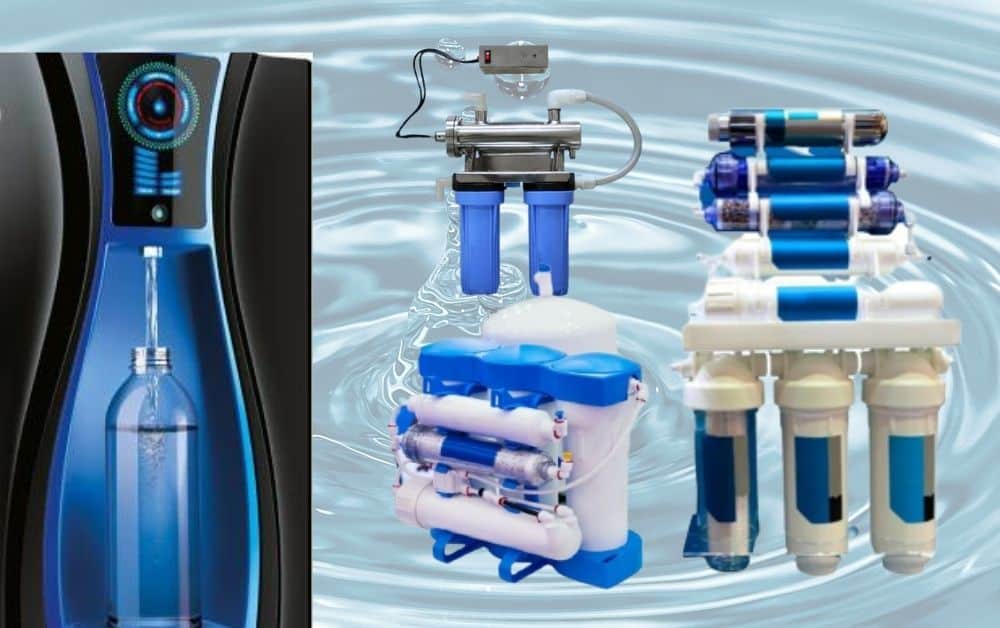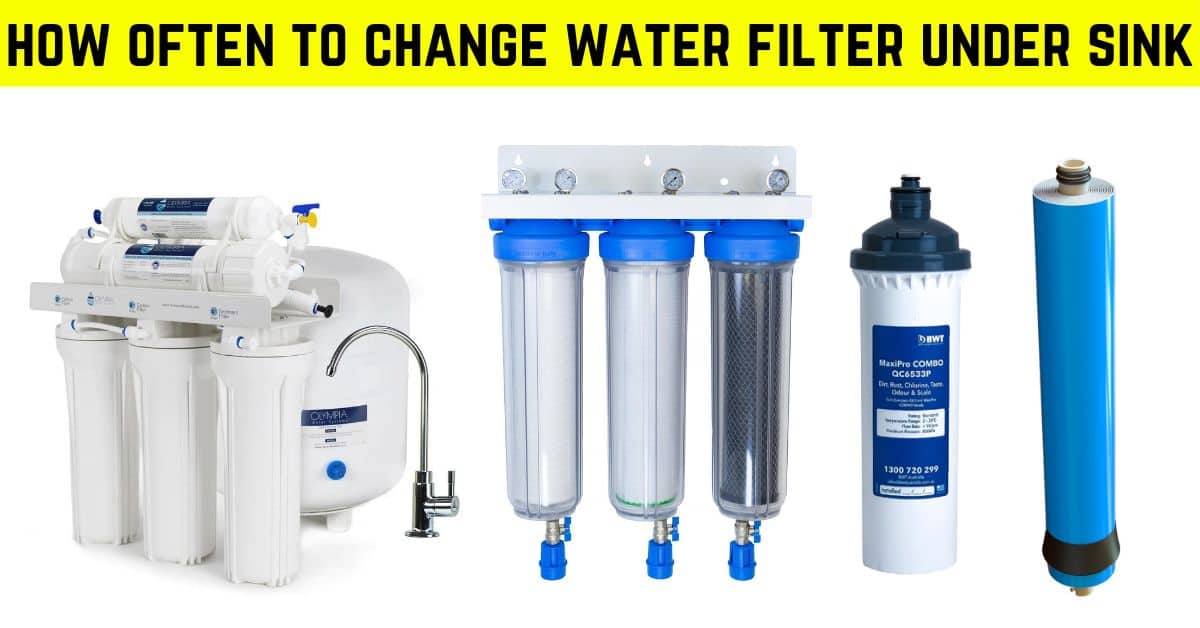When it comes to water filters, how often do you need to change them?
Depending on the type of filter and the amount of water used, most filters will need to be replaced every six months to a year.
However, suppose your family drinks a lot of water, or you have a large home with multiple people using water from the sink.
In that case, you may need to change the sink water filter more frequently.
Ensure you check your water filtration systems regularly and follow the manufacturer’s recommendations for replacement water filters.
Otherwise, you could end up contaminating water from your separate faucet.
How Often To Change Yours Under Sink Water Filter?
Changing your under-sink water filter is essential to ensure you get the best possible water quality.
If you have a sediment filter, it will need to be changed more frequently than other types of filters.
Sediment filters can become clogged quickly, so it’s essential to check them every few months and change them as needed.
If you have a carbon block filter, you must change it every 6 months to one year.
Carbon block filters remove contaminants from your water flow. Keeping them fresh is essential to ensure the best possible water quality.
If you have a reverse osmosis system, you must change your filter every 6 months to one year.
Reverse osmosis systems remove impurities from your water. Keeping them fresh is essential to ensure the best possible clean water quality.
By changing your sink water filter systems regularly, you can rest assured that your family is drinking clean water that meets your high standards for quality.
To get the most out of your under-sink water filter installation, follow the manufacturer’s instructions for replacement and maintenance.
How To Know When To Change Your 3-Stage Under The Sink Water Filter?

Regularly changing your 3-stage under-the-sink systems is essential to filter your water adequately.
Check the manufacturer’s recommendations. Most manufacturers will have specific recommendations on how often to change your pre-filters. Here are a few tips on how to know when it’s time to change your filters:
- Check your water quality. If you notice a change in your water quality, it may be time to change your filters.
- Check the condition of your filters. If your filters look dirty or clogged, it’s time to replace them.
- Pay attention to your water pressure. If you notice a decrease in water pressure, it could signify that your filters need replacement.
- You can change the filter when you feel changing the color and particle present in the water.
- If your water gives an unpleasant smell or taste, it is time to replace your old filters.
- Check the manufacturer’s instruction manual to know the average time for filter replacement.
By following these expert tips, you can ensure your filter works correctly and provide clean, fresh water.
Factors Affecting Under-Sink Water Filter Lifespan?
The following are some factors that can affect the lifespan of your under-sink water filter system:
- The quality of your incoming water supply: If it is high in harsh sediment or other contaminants, your filter will have to work harder to remove them from the water, which will shorten its lifespan.
- Frequency of use: Suppose you have a family of four, and everyone takes showers daily. In that case, you may need to change your filter more often than someone who lives alone and only uses the sink faucet for drinking and cooking.
- Size of your household: An enormous household will use more filtered water than a smaller one, so the filter must be replaced more frequently.
- The types of water filters you have: Some filters are designed to last longer than others. For example, carbon block filters typically have a longer lifespan than sediment filters.
- Manufacturer’s recommendations: Be sure to follow the manufacturer’s recommendations for replacement frequency to get the most out of your kitchen faucet water filter.
By considering these factors, you can extend the lifespan of your filtration process and enjoy clean, fresh-tasting water for years to come.
Finally, the best thing to do is consult the manufacturer’s instructions; they can give you specific guidance based on your filter type.
Who Should Buy An Under-Sink Water Filter?
Not everyone needs a filter. Suppose your municipality has a good water treatment plant, and you’re happy with the taste of your tap water. In that case, you don’t need one.
However, you’re concerned about your water’s quality or want it to taste better. In that case, a filter could be a good investment.
There are a few different factors to consider when deciding if a sink filter:
1. The quality of your water
Suppose you’re concerned about the quality of your water. In that case, it’s worth researching whether your area has known contaminants.
The water quality is good if you live in an urban area.
However, if you live in a rural area or your municipality doesn’t have a good water treatment plant, a sink filter can help to remove contaminants from your water.
2. The taste of your water
The taste of your water is another factor to consider. If you’re not happy with the taste of your tap water, a sink filter can help to improve the taste.
It is because the filter will remove any impurities from the water that could be causing the sour taste.
3. Your budget
Finally, you’ll need to consider your budget when deciding if a sink filter is suitable. These filters can range in price from a few hundred dollars to over a thousand dollars.
If you’re on a tight budget, consider a less expensive option, such as a countertop water filter.
Suppose you’re concerned about the quality of your water. In that case, the taste of your water, or you’re simply looking for a way to improve the taste of your tap water, a sink filter could be a good investment.
These filters can range in price, so consider your budget when deciding.
How Do I Know When To Change My Shower Head Filters?
It’s essential to regularly change the filters in your shower head to ensure that the water coming out is clean and free of impurities.
Here are a few signs that it might be time to replace your shower head filters:
- The water pressure from your shower is noticeably lower than usual
- There is an unusual amount of sediment or other particles in the water
- The water has an unpleasant chlorine taste or smell
- You notice skin irritation after showering
If you notice any of these signs, replacing the filters in your shower head as soon as possible is a good idea.
Depending on the type of filter you have, you may be able to clean it and reuse it, or you may need to buy a new one. Consult the owner’s manual for specific instructions.
Get Replacement Filters Auto-Shipped When You Need Them?
If you have a regular filter-changing schedule, signing up for an auto-shipment program can be helpful.
That way, you’ll always have to remember to order new filters or run out. Plus, most companies offer discounts for subscribers.
To find the best deal on replacement filters, shop around and compare prices from different companies.
Read the fine print to know what you’re getting and when your first shipment will arrive.
Once you’ve found the perfect auto-shipment program, relax; your replacement filters will arrive on time!
Conclusion
In conclusion, according to the manufacturer’s recommendations, you should change your sink water filter every 3-6 months.
Changing your water filter ensures your drinking water is safe and tastes great.
Please comment below if you have any questions about how often to change your water filter. Thanks for reading!
FAQs:
What Is An Under-Sink Water Filter?
These filters are designed to remove impurities from your home’s municipal water supply.
They are installed under your kitchen sink and use various filtration methods to cleanse your water.
Filters can be an excellent investment for families who want to ensure that their drinking water on demand is contaminant-free.
Why Should You Install An Under-Sink Water Filter?
Most of us take clean water for granted. We turn on the separate faucet, and out comes water that is safe to drink, cook, and bathe in.
Unfortunately, this isn’t the case for everyone. According to the Environmental Working Group (EWG) report, more than 270 contaminants are present in U.S. tap water.
While the Environmental Protection Agency (EPA) regulates public water systems, they only require treatment for a handful of these contaminants.
This means that many potentially harmful chemicals can slip through the cracks and end up in our drinking water.
One way to protect yourself and your family from these contaminants is to install an under-sink water filter in your home.
What Are The Benefits And Works Of Under Sink Water Filters?
Filters are designed to remove impurities from your water supply, providing clean, fresh-tasting water for drinking and cooking.
Carbon block filters effectively remove many contaminants, including chlorine, lead, and sediment.
RO systems use a semi-permeable membrane to remove impurities from your healthy water. RO systems effectively remove dissolved minerals, bacteria, and viruses.
Filters can provide clean, fresh-tasting water while protecting you from potentially harmful contaminants.
If you are concerned about the quality of your water supply, these filter types may be the best option.






